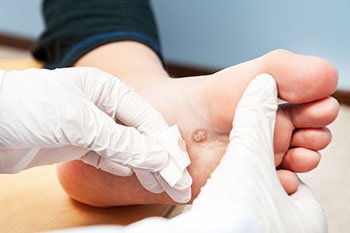Connect With Us
Items filtered by date: August 2020
Causes of Ankle Pain
 Ankle pain can have a variety of causes. While an ankle sprain may have an obvious cause, usually by rolling the ankle, there are plenty of more subtle injuries that can occur. These subtle injuries can include an ankle impingement which is a wedging at the front of the ankle, or an avulsion fracture, meaning a small piece of bone fractures away from the main bone due to the pull of a tendon or ligament that is attached to the bone. Tarsal tunnel syndrome is the pinching of the nerve that runs through the ankle, and even various forms of arthritis are all potential causes of ankle pain that will require treatment from a podiatrist. Once a diagnosis has been made, a podiatrist can then minimize pain and customize a treatment plan that is right for you.
Ankle pain can have a variety of causes. While an ankle sprain may have an obvious cause, usually by rolling the ankle, there are plenty of more subtle injuries that can occur. These subtle injuries can include an ankle impingement which is a wedging at the front of the ankle, or an avulsion fracture, meaning a small piece of bone fractures away from the main bone due to the pull of a tendon or ligament that is attached to the bone. Tarsal tunnel syndrome is the pinching of the nerve that runs through the ankle, and even various forms of arthritis are all potential causes of ankle pain that will require treatment from a podiatrist. Once a diagnosis has been made, a podiatrist can then minimize pain and customize a treatment plan that is right for you.
Ankle pain can be caused by a number of problems and may be potentially serious. If you have ankle pain, consult with one of our podiatrists from The Podiatry Center, PC. Our doctors will assess your condition and provide you with quality foot and ankle treatment.
Ankle pain is any condition that causes pain in the ankle. Due to the fact that the ankle consists of tendons, muscles, bones, and ligaments, ankle pain can come from a number of different conditions.
Causes
The most common causes of ankle pain include:
- Types of arthritis (rheumatoid, osteoarthritis, and gout)
- Ankle sprains
- Broken ankles
- Achilles tendinitis
- Achilles tendon rupture
- Stress fractures
- Bursitis
- Tarsal tunnel syndrome
- Plantar fasciitis
Symptoms
Symptoms of ankle injury vary based upon the condition. Pain may include general pain and discomfort, swelling, aching, redness, bruising, burning or stabbing sensations, and/or loss of sensation.
Diagnosis
Due to the wide variety of potential causes of ankle pain, podiatrists will utilize a number of different methods to properly diagnose ankle pain. This can include asking for personal and family medical histories and of any recent injuries. Further diagnosis may include sensation tests, a physical examination, and potentially x-rays or other imaging tests.
Treatment
Just as the range of causes varies widely, so do treatments. Some more common treatments are rest, ice packs, keeping pressure off the foot, orthotics and braces, medication for inflammation and pain, and surgery.
If you have any questions, please feel free to contact our office located in Millburn, NJ. We offer the newest diagnostic and treatment technologies for all your foot care needs.
Read more about Ankle Pain
Causes of Ankle Pain
 Ankle pain can have a variety of causes. While an ankle sprain may have an obvious cause, usually by rolling the ankle, there are plenty of more subtle injuries that can occur. These subtle injuries can include an ankle impingement which is a wedging at the front of the ankle, or an avulsion fracture, meaning a small piece of bone fractures away from the main bone due to the pull of a tendon or ligament that is attached to the bone. Tarsal tunnel syndrome is the pinching of the nerve that runs through the ankle, and even various forms of arthritis are all potential causes of ankle pain that will require treatment from a podiatrist. Once a diagnosis has been made, a podiatrist can then minimize pain and customize a treatment plan that is right for you.
Ankle pain can have a variety of causes. While an ankle sprain may have an obvious cause, usually by rolling the ankle, there are plenty of more subtle injuries that can occur. These subtle injuries can include an ankle impingement which is a wedging at the front of the ankle, or an avulsion fracture, meaning a small piece of bone fractures away from the main bone due to the pull of a tendon or ligament that is attached to the bone. Tarsal tunnel syndrome is the pinching of the nerve that runs through the ankle, and even various forms of arthritis are all potential causes of ankle pain that will require treatment from a podiatrist. Once a diagnosis has been made, a podiatrist can then minimize pain and customize a treatment plan that is right for you.
Ankle pain can be caused by a number of problems and may be potentially serious. If you have ankle pain, consult with one of our podiatrists from The Podiatry Center, PC. Our doctors will assess your condition and provide you with quality foot and ankle treatment.
Ankle pain is any condition that causes pain in the ankle. Due to the fact that the ankle consists of tendons, muscles, bones, and ligaments, ankle pain can come from a number of different conditions.
Causes
The most common causes of ankle pain include:
- Types of arthritis (rheumatoid, osteoarthritis, and gout)
- Ankle sprains
- Broken ankles
- Achilles tendonitis
- Achilles tendon rupture
- Stress fractures
- Bursitis
- Tarsal tunnel syndrome
- Plantar fasciitis
Symptoms
Symptoms of ankle injury vary based upon the condition. Pain may include general pain and discomfort, swelling, aching, redness, bruising, burning or stabbing sensations, and/or loss of sensation.
Diagnosis
Due to the wide variety of potential causes of ankle pain, podiatrists will utilize a number of different methods to properly diagnose ankle pain. This can include asking for personal and family medical histories and of any recent injuries. Further diagnosis may include sensation tests, a physical examination, and potentially x-rays or other imaging tests.
Treatment
Just as the range of causes varies widely, so do treatments. Some more common treatments are rest, ice packs, keeping pressure off the foot, orthotics and braces, medication for inflammation and pain, and surgery.
If you have any questions, please feel free to contact our office located in Millburn, NJ . We offer the newest diagnostic and treatment technologies for all your foot care needs.
Reminder: When Was the Last Time...?
Reminder: When Was the Last Time...?
The Two Types of Plantar Warts
 Plantar warts are warts that appear on the bottom of the feet. They are caused by the human papillomavirus, also known as HPV. A plantar wart may resemble a callus, as it is characterized by tough, thick tissue. It may cause pain while you stand or walk, or when any pressure is applied to it. Tiny black dots, which are actually dried blood contained in tiny blood vessels, often appear on the surface of plantar warts. There are two types of plantar warts. Solitary plantar warts are single warts that appear on their own and slowly increase in size. They may eventually multiply, forming additional warts. Mosaic plantar warts are a cluster of several small warts that grow together in the same area, and are usually more difficult to treat. If you have plantar warts, it is strongly recommended that you visit a podiatrist for treatment.
Plantar warts are warts that appear on the bottom of the feet. They are caused by the human papillomavirus, also known as HPV. A plantar wart may resemble a callus, as it is characterized by tough, thick tissue. It may cause pain while you stand or walk, or when any pressure is applied to it. Tiny black dots, which are actually dried blood contained in tiny blood vessels, often appear on the surface of plantar warts. There are two types of plantar warts. Solitary plantar warts are single warts that appear on their own and slowly increase in size. They may eventually multiply, forming additional warts. Mosaic plantar warts are a cluster of several small warts that grow together in the same area, and are usually more difficult to treat. If you have plantar warts, it is strongly recommended that you visit a podiatrist for treatment.
Plantar warts can be very uncomfortable. If you need your feet checked, contact one of our podiatrists from The Podiatry Center, PC. Our doctors will assist you with all of your foot and ankle needs.
About Plantar Warts
Plantar warts are the result of HPV, or human papillomavirus, getting into open wounds on the feet. They are mostly found on the heels or balls of the feet.
While plantar warts are generally harmless, those experiencing excessive pain or those suffering from diabetes or a compromised immune system require immediate medical care. Plantar warts are easily diagnosed, usually through scraping off a bit of rough skin or by getting a biopsy.
Symptoms
- Lesions on the bottom of your feet, usually rough and grainy
- Hard or thick callused spots
- Wart seeds, which are small clotted blood vessels that look like little black spots
- Pain, discomfort, or tenderness of your feet when walking or standing
Treatment
- Freezing
- Electric tool removal
- Laser Treatment
- Topical Creams (prescription only)
- Over-the-counter medications
To help prevent developing plantar warts, avoid walking barefoot over abrasive surfaces that can cause cuts or wounds for HPV to get into. Avoiding direct contact with other warts, as well as not picking or rubbing existing warts, can help prevent the further spread of plantar warts. However, if you think you have developed plantar warts, speak to your podiatrist. He or she can diagnose the warts on your feet and recommend the appropriate treatment options.
If you have any questions please feel free to contact our office located in Millburn, NJ. We offer the newest diagnostic and treatment technologies for all your foot and ankle needs.
Read more about Plantar WartsThe Two Types of Plantar Warts
 Plantar warts are warts that appear on the bottom of the feet. They are caused by the human papillomavirus, also known as HPV. A plantar wart may resemble a callus, as it is characterized by tough, thick tissue. It may cause pain while you stand or walk, or when any pressure is applied to it. Tiny black dots, which are actually dried blood contained in tiny blood vessels, often appear on the surface of plantar warts. There are two types of plantar warts. Solitary plantar warts are single warts that appear on their own and slowly increase in size. They may eventually multiply, forming additional warts. Mosaic plantar warts are a cluster of several small warts that grow together in the same area, and are usually more difficult to treat. If you have plantar warts, it is strongly recommended that you visit a podiatrist for treatment.
Plantar warts are warts that appear on the bottom of the feet. They are caused by the human papillomavirus, also known as HPV. A plantar wart may resemble a callus, as it is characterized by tough, thick tissue. It may cause pain while you stand or walk, or when any pressure is applied to it. Tiny black dots, which are actually dried blood contained in tiny blood vessels, often appear on the surface of plantar warts. There are two types of plantar warts. Solitary plantar warts are single warts that appear on their own and slowly increase in size. They may eventually multiply, forming additional warts. Mosaic plantar warts are a cluster of several small warts that grow together in the same area, and are usually more difficult to treat. If you have plantar warts, it is strongly recommended that you visit a podiatrist for treatment.
Plantar warts can be very uncomfortable. If you need your feet checked, contact one of our podiatrists from The Podiatry Center, PC. Our doctors will assist you with all of your foot and ankle needs.
About Plantar Warts
Plantar warts are the result of HPV, or human papillomavirus, getting into open wounds on the feet. They are mostly found on the heels or balls of the feet.
While plantar warts are generally harmless, those experiencing excessive pain or those suffering from diabetes or a compromised immune system require immediate medical care. Plantar warts are easily diagnosed, usually through scraping off a bit of rough skin or by getting a biopsy.
Symptoms
- Lesions on the bottom of your feet, usually rough and grainy
- Hard or thick callused spots
- Wart seeds, which are small clotted blood vessels that look like little black spots
- Pain, discomfort, or tenderness of your feet when walking or standing
Treatment
- Freezing
- Electric tool removal
- Laser Treatment
- Topical Creams (prescription only)
- Over-the-counter medications
To help prevent developing plantar warts, avoid walking barefoot over abrasive surfaces that can cause cuts or wounds for HPV to get into. Avoiding direct contact with other warts, as well as not picking or rubbing existing warts, can help prevent the further spread of plantar warts. However, if you think you have developed plantar warts, speak to your podiatrist. He or she can diagnose the warts on your feet and recommend the appropriate treatment options.
If you have any questions please feel free to contact our office located in Millburn, NJ . We offer the newest diagnostic and treatment technologies for all your foot and ankle needs.
Podiatrists and Diabetic Patients
 Research has shown the importance of diabetic patients paying close attention to their feet. The elevated sugar levels that can cause diabetes may produce numbing sensations in their feet, and existing cuts, bruises, and wounds may be difficult to feel. If left untreated, infections may develop, and in severe cases amputation may be necessary. There are methods that can be implemented which may help protect the feet of diabetic patients. Circulation may improve when smoking is stopped. Additionally, the feet will feel better when they are washed and dried daily, followed by applying a moisturizer, which may help to prevent cracked heels. It is strongly recommended that diabetic patients be under the care of a podiatrist who can properly manage this condition.
Research has shown the importance of diabetic patients paying close attention to their feet. The elevated sugar levels that can cause diabetes may produce numbing sensations in their feet, and existing cuts, bruises, and wounds may be difficult to feel. If left untreated, infections may develop, and in severe cases amputation may be necessary. There are methods that can be implemented which may help protect the feet of diabetic patients. Circulation may improve when smoking is stopped. Additionally, the feet will feel better when they are washed and dried daily, followed by applying a moisturizer, which may help to prevent cracked heels. It is strongly recommended that diabetic patients be under the care of a podiatrist who can properly manage this condition.
Diabetic foot care is important in preventing foot ailments such as ulcers. If you are suffering from diabetes or have any other concerns about your feet, contact one of our podiatrists from The Podiatry Center, PC. Our doctors can provide the care you need to keep you pain-free and on your feet.
Diabetic Foot Care
Diabetes affects millions of people every year. The condition can damage blood vessels in many parts of the body, especially the feet. Because of this, taking care of your feet is essential if you have diabetes, and having a podiatrist help monitor your foot health is highly recommended.
The Importance of Caring for Your Feet
- Routinely inspect your feet for bruises or sores.
- Wear socks that fit your feet comfortably.
- Wear comfortable shoes that provide adequate support.
Patients with diabetes should have their doctor monitor their blood levels, as blood sugar levels play such a huge role in diabetic care. Monitoring these levels on a regular basis is highly advised.
It is always best to inform your healthcare professional of any concerns you may have regarding your feet, especially for diabetic patients. Early treatment and routine foot examinations are keys to maintaining proper health, especially because severe complications can arise if proper treatment is not applied.
If you have any questions please feel free to contact our office located in Millburn, NJ. We offer the newest diagnostic and treatment technologies for all your foot and ankle needs.
Read more about Diabetic Foot CarePodiatrists and Diabetic Patients
 Research has shown the importance of diabetic patients paying close attention to their feet. The elevated sugar levels that can cause diabetes may produce numbing sensations in their feet, and existing cuts, bruises, and wounds may be difficult to feel. If left untreated, infections may develop, and in severe cases amputation may be necessary. There are methods that can be implemented which may help protect the feet of diabetic patients. Circulation may improve when smoking is stopped. Additionally, the feet will feel better when they are washed and dried daily, followed by applying a moisturizer, which may help to prevent cracked heels. It is strongly recommended that diabetic patients be under the care of a podiatrist who can properly manage this condition.
Research has shown the importance of diabetic patients paying close attention to their feet. The elevated sugar levels that can cause diabetes may produce numbing sensations in their feet, and existing cuts, bruises, and wounds may be difficult to feel. If left untreated, infections may develop, and in severe cases amputation may be necessary. There are methods that can be implemented which may help protect the feet of diabetic patients. Circulation may improve when smoking is stopped. Additionally, the feet will feel better when they are washed and dried daily, followed by applying a moisturizer, which may help to prevent cracked heels. It is strongly recommended that diabetic patients be under the care of a podiatrist who can properly manage this condition.
Diabetic foot care is important in preventing foot ailments such as ulcers. If you are suffering from diabetes or have any other concerns about your feet, contact one of our podiatrists from The Podiatry Center, PC. Our doctors can provide the care you need to keep you pain-free and on your feet.
Diabetic Foot Care
Diabetes affects millions of people every year. The condition can damage blood vessels in many parts of the body, especially the feet. Because of this, taking care of your feet is essential if you have diabetes, and having a podiatrist help monitor your foot health is highly recommended.
The Importance of Caring for Your Feet
- Routinely inspect your feet for bruises or sores.
- Wear socks that fit your feet comfortably.
- Wear comfortable shoes that provide adequate support.
Patients with diabetes should have their doctor monitor their blood levels, as blood sugar levels play such a huge role in diabetic care. Monitoring these levels on a regular basis is highly advised.
It is always best to inform your healthcare professional of any concerns you may have regarding your feet, especially for diabetic patients. Early treatment and routine foot examinations are keys to maintaining proper health, especially because severe complications can arise if proper treatment is not applied.
If you have any questions please feel free to contact our office located in Millburn, NJ . We offer the newest diagnostic and treatment technologies for all your foot and ankle needs.
Why Live with Pain and Numbness in Your Feet?
Why Live with Pain and Numbness in Your Feet?
Blog Archives
- April 2025
- March 2025
- February 2025
- January 2025
- December 2024
- November 2024
- October 2024
- September 2024
- August 2024
- July 2024
- June 2024
- May 2024
- April 2024
- March 2024
- February 2024
- January 2024
- December 2023
- November 2023
- October 2023
- September 2023
- August 2023
- July 2023
- June 2023
- May 2023
- April 2023
- March 2023
- February 2023
- January 2023
- December 2022
- November 2022
- October 2022
- September 2022
- August 2022
- July 2022
- June 2022
- May 2022
- April 2022
- March 2022
- February 2022
- January 2022
- December 2021
- November 2021
- October 2021
- September 2021
- August 2021
- July 2021
- June 2021
- May 2021
- April 2021
- March 2021
- February 2021
- January 2021
- December 2020
- November 2020
- October 2020
- September 2020
- August 2020
- July 2020
- June 2020
- May 2020
- April 2020
- March 2020
- February 2020
- January 2020
- December 2019
- November 2019
- October 2019
- September 2019
- August 2019
- July 2019
- June 2019
- May 2019
- April 2019
- March 2019
- February 2019
- January 2019
- December 2018
- November 2018
- October 2018
- September 2018
- August 2018
- July 2018
- June 2018
- May 2018
- April 2018
- March 2018
- February 2018
- January 2018
- December 2017
- November 2017
- October 2017
- September 2017
- August 2017
- July 2017
- June 2017
- May 2017
- April 2017
- March 2017
- February 2017
- January 2017
- December 2016
- November 2016
- October 2016
- September 2016
- August 2016
- July 2016
- June 2016
- May 2016
- April 2016
- March 2016
- February 2016
- January 2016
- December 2015
- November 2015
- October 2015
- September 2015
- August 2015
- July 2015
- June 2015
- May 2015
- January 2014
- December 2013
- November 2013
- October 2013
- September 2013
- August 2013
- July 2013
- June 2013
- May 2013
- April 2013
- March 2013
- February 2013
- January 2013
- December 2012
- November 2012
- October 2012
- September 2012
- August 2012
- July 2012
- June 2012




